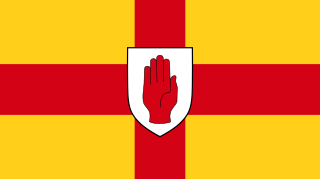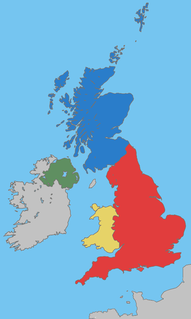
Northern Ireland is a part of the United Kingdom that is variously described as a country, province, territory or region. Located in the northeast of the island of Ireland, Northern Ireland shares a border to the south and west with the Republic of Ireland. In 2011, its population was 1,810,863, constituting about 30% of the island's population and about 3% of the UK's population. The Northern Ireland Assembly, established by the Northern Ireland Act 1998, holds responsibility for a range of devolved policy matters, while other areas are reserved for the British government. Northern Ireland co-operates with the Republic of Ireland in several areas.

The Troubles were an ethno-nationalist period of conflict in Northern Ireland that lasted about 30 years from the late 1960s to 1998. Also known internationally as the Northern Ireland conflict, it is sometimes described as an "irregular war" or "low-level war". The conflict began in the late 1960s and is usually deemed to have ended with the Good Friday Agreement of 1998. Although the Troubles mostly took place in Northern Ireland, at times the violence spilled over into parts of the Republic of Ireland, England, and mainland Europe.

Ulster is one of the four traditional Irish provinces, in the north of Ireland. It is made up of nine counties: six of these constitute Northern Ireland ; the remaining three are in the Republic of Ireland.

The Ulster Unionist Party (UUP) is a unionist and conservative political party in Northern Ireland. Having gathered support in Ulster, the northern province in Ireland, during the late-nineteenth and early-twentieth centuries, the party governed Northern Ireland between 1921 and 1972. It was supported by most unionist voters throughout the conflict known as the Troubles, during which time it was often referred to as the Official Unionist Party (OUP). Between 1905 and 1972, its peers and MPs took the Conservative whip at Westminster, in effect functioning as the Northern Irish branch of the Conservative and Unionist Party. This arrangement came to an end in 1972 over disagreements over the Sunningdale Agreement. The two parties have remained institutionally separate ever since, with the exception of the 2009–2012 Ulster Conservatives and Unionists electoral alliance.

Omagh is the county town of County Tyrone, Northern Ireland. It is situated where the rivers Drumragh and Camowen meet to form the Strule. Northern Ireland's capital city Belfast is 68 miles (109.5 km) to the east of Omagh, and Derry is 34 miles (55 km) to the north.

The only official flag in Northern Ireland is the Union Flag of the United Kingdom. The flying of various flags in Northern Ireland is a significant sectarian issue, with different communities identifying with different flags.
John Robert Beggs, commonly known as Roy Beggs, is an Ulster Unionist Party (UUP) politician.

Dungannon is a town in County Tyrone, Northern Ireland. It is the third-largest town in the county and had a population of 14,340 at the 2011 Census. The Dungannon and South Tyrone Borough Council had its headquarters in the town, though since 2015 it has been covered by Mid-Ulster District Council.

North Down is a parliamentary constituency in the United Kingdom House of Commons. The current MP is Stephen Farry of the Alliance Party. Farry was elected to the position in the 2019 General Election, replacing the incumbent Sylvia Hermon, who had held the position since being elected to it in the 2001 general election, but chose not to contest in the 2019 election.

Antrim is a town and civil parish in County Antrim in the northeast of Northern Ireland, on the banks of the Six Mile Water, on the north shore of Lough Neagh. It had a population of 23,375 people in the 2011 Census. It is the county town of County Antrim and was the administrative centre of Antrim Borough Council. It is 22 miles (35 km) northwest of Belfast by rail.

Magherafelt is a small town and civil parish in County Londonderry, Northern Ireland. It had a population of 8,805 at the 2011 Census. It is the biggest town in the south of the county and is the social, economic and political hub of the area. It is part of Mid-Ulster District.

St Malachy's College, in Belfast, Northern Ireland, is the oldest Catholic diocesan college in Ulster. The college's alumni and students are known as Malachians.

The Irish Unionist Alliance (IUA), also known as the Irish Unionist Party or simply the Unionists, was a unionist political party founded in Ireland in 1891 from the Irish Loyal and Patriotic Union to oppose plans for home rule for Ireland within the United Kingdom of Great Britain and Ireland. The party was led for much of its existence by Colonel Edward James Saunderson and later by William St John Brodrick, Earl of Midleton. In total, eighty-six members of the House of Lords affiliated themselves with the Irish Unionist Alliance, although its broader membership was relatively small.

The Royal Belfast Academical Institution is an independent grammar school in Belfast, Northern Ireland. With the support of Belfast's leading reformers, it opened its doors in 1814. Until 1849, when it was superseded by what today is Queens University, the institution pioneered Belfast's first programme of collegiate education. Locally referred to as Inst, the modern school educates boys from ages 11 to 18. It is one of the eight Northern Irish schools represented on the Headmasters' and Headmistresses' Conference. The school occupies an 18-acre site in the centre of the city on which its first buildings were erected.

The Ulster Hall is a concert hall and grade A listed building in Belfast, Northern Ireland. Situated on Bedford Street in Belfast city centre, the hall hosts concerts, classical recitals, craft fairs and political party conferences.
Ballymena Rugby Football Club is a rugby union club based in the town of Ballymena, Northern Ireland, playing in Division 2A of the All-Ireland League. It is affiliated to the Ulster branch of the Irish Rugby Football Union. The club fields 5 adult teams and an under-20 team. In youth rugby there are under-18, under-16 and under-14 teams. The incoming club captain for the 2020/21 season will be David Sloan.

John Harold Hewitt, who was born in Belfast, Northern Ireland, was the most significant Belfast poet to emerge before the 1960s generation of Northern Irish poets that included Seamus Heaney, Derek Mahon and Michael Longley. He was appointed the first writer-in-residence at Queen's University Belfast in 1976. His collections include The Day of the Corncrake (1969) and Out of My Time: Poems 1969 to 1974 (1974). He was also made a Freeman of the City of Belfast in 1983, and was awarded honorary doctorates the University of Ulster and Queen's University Belfast.

The United Kingdom of Great Britain and Northern Ireland (UK), since 1922, comprises four constituent countries: England, Scotland, and Wales, as well as Northern Ireland. The UK Prime Minister's website has used the phrase "countries within a country" to describe the United Kingdom. Some statistical summaries, such as those for the twelve NUTS 1 regions of the United Kingdom, refer to Scotland, Wales and Northern Ireland as "regions". With regard to Northern Ireland, Scotland and Wales particularly, the descriptive name one uses "can be controversial, with the choice often revealing one's political preferences".
David Allen MBE was a teacher, trade unionist and politician from Northern Ireland.
Terence Philip FlanaganPPRUA HRUA RHAMBE was a landscape painter and teacher from Northern Ireland.















